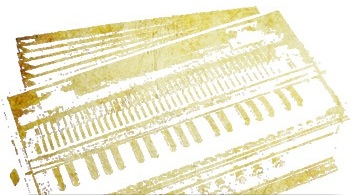



 |

Kirtan+ConfettiMusic and Mantra playlists |
 |

Learn harmonium!Online music classes |
 |

Krishna Das
|








 |

Kirtan+ConfettiMusic and Mantra playlists |
 |

Learn harmonium!Online music classes |
 |

Krishna Das
|
 posted by Daniel on November 21st, 2010
posted by Daniel on November 21st, 2010I'm ten thousand miles above the ground, pondering fluffy fields of geometric cloud cover. My final destination is Nashville, to hold a harmonium intensive, but right now I am elated to have escaped the dreary drizzle of San Francisco's grey skies. The sun is shining brightly, as it always is above the clouds, and I ponder how my emotions and moods can obscure radiant happiness. I begin to reflect on a time some years ago, when I experienced uncontrollable ups and downs, which now seem as distant as San Francisco's weather.
When I was nineteen years old, I abruptly stopped making music. Previously, I had musicked all my life ~ had probably kicked drum beats on the inside of my mother's uterus ~ and it had been a core element of my identity. I loved instruments and played lots of them, and spent time daily improvising on saxophone or piano.
Then, in 2003, a fascination with meditation led me into a monastic Buddhist community abroad, where I spent nearly two years. I read about nirvana, enlightenment, Buddha nature, and the path of meditation. I strongly desired to experience the fruits of meditation, and it seemed that music had no important role to play. I was so absorbed in this pursuit, that music just went out the window. Gone. In it's place: Silence. Stillness. The pure ringing of a meditation gong.
Over those two years, I experienced a gradual increase in mood swings. Two or three months of feeling quite good would alternate with two or three months of "dry spell." The dry spells were strange ~ I had never experienced them before. It was as if my brain got a little dried out. I imagined there might be a crucial neurochemical substance that was running low, and wondered if it had to do with the seasons, or my diet. During these times, my emotions would be stiff, unflowing, and my interest in relating with friends would diminish. I felt stuck in my head ~ able to read, study, meditate, and be critical of the other students in my classes. But my heart was inaccessible, and I would tell myself to hang in there for a couple months till I felt good again.
As time went on, I experienced an anxious buzz, which made it hard to sink in to meditation. I began to wonder if my trust of meditation as a complete spiritual path was misplaced. After two years abroad, I returned to America, dissatisfied, anxious, harboring many spiritual ideas, and having a more difficult time relating to friends and family. It was at this point that I was reconnected with my saxophone.
While I had no intellectual reason to make music (it did not fit in with my monasticized notions of spiritually relevant activities), I picked up the sax for old time's sake. My embouchure muscles (in the lips and mouth) had atrophied, and I couldn't produce a satisfying tone. But my body's exuberant visceral response to playing music was unmistakable ~ I had not felt an urge that strong in a long time. I began playing saxophone for six hours a day ~ scales, tone exercises, jazz songs, improvisations, or jamming along with CDs I found at my brother's apartment where I was staying. It took over, and reclaimed me. I didn't understand what I was going to do with it, but clearly I could not deny it. It was like drinking after having been thirsty for two years, without knowing I had been thirsty. It felt good.
That year (I was twenty-one), I still experienced multi-month mood seasons, but their amplitude diminished, and by the following year they vanished altogether. I could always feel, and began to understand the connection between my own emotions, and the flavor of music I made while improvising. Music wasn't just an activity; it was a crucial expression of the inexpressible feelings within me. An outlet for all the kinks, passions, frustrations, and creative juices, which otherwise I only knew how to suppress.
In his fascinating book "Musicophilia: Tales of Music and the Brain," neurologist and music therapist Oliver Sacks shares a letter he received from a young man in his thirties, who had been diagnosed with bipolar disorder when he was nineteen. His manic and depressive episodes were both severe, lasting months at a time. However, he had discovered in his twenties that playing piano could have a striking effect on his state of mind. His letter follows:
"If I sat at a piano, I could start to play, to improvise, and to tune into my mood. If my mood was elevated, I could match that elevated mood with the music, and after a period of playing, in almost a trance-like state, I could bring my mood down to a more normal level. Likewise, if my mood was depressed, I was able to bring my mood up. It is as if I am able to use music in the same way that some people use therapy or medications to stabilize their mood... Listening to music doesn't do the same thing for me by any means - it has to do with the output, and the way that I am able to control every aspect of the music - style, tempo, texture and dynamics."
| [see permalink] |